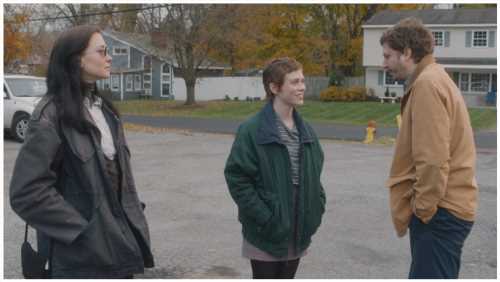
Depending on the state of your own family network, the relationship between the trio of grown siblings at the center of “The Adults” may strike you as intensely, skin-crawlingly familiar or quite desolately alien. Either way, Dustin Guy Defa’s determinedly quiet family-reunion drama seeks to be discomfiting, gradually giving the viewer that hollow, lurching, pit-of-the-stomach feeling that either precedes a dreaded encounter or follows a disappointing one. That might not sounds like a good thing, but in the context of this small, expansively sad film, it is one: From that queasiness comes bristly tension, tautening and deepening what otherwise seems a low-key, low-stakes character study, and eventually a sweet, conciliatory sliver of hope too.
Defa’s previous feature, 2017’s meandering, windblown New York City mosaic “Person to Person,” was already a tiny microbudget enterprise, so it wouldn’t quite be accurate to describe “The Adults,” with its more contained ensemble and thematic thrust, as a smaller film still. But it is a tighter one, with a short, slightly elastic, day-by-day framework that sharpens the behind-the-beat hesitations and anxious, by-design lulls of Defa’s writing. He remains an acquired taste. For every person who was charmed by “Person to Person’s” shuffling intimacy, there was at least one other who found it too precious by half. That will likely apply to “The Adults” too, which makes no apology for the shared, outgrown precociousness of several characters here. You don’t have to like people to see some truth in them. Defa, it seems, happily accepts that trade-off.
As in “Person to Person,” Michael Cera’s signature diffident awkwardness as a performer is key to Defa’s uneasy tone, though some things have subtly changed. Now in his mid-thirties, Cera hasn’t been seen in the movies — not counting some voice work — in five years, and there’s now the barest hint of wear and tear in his soft, boyish demeanor. “The Adults,” its title dripping with irony, shrewdly casts a performer who once seemed eternally adolescent as a notional grown-up who hasn’t yet found his feet, his youthful vacillation just beginning to calcify into a permanent adult vagueness.
The screenplay is pointedly short on details about his character, Eric, as he arrives from Portland for a few days’ stay in his grayly autumnal East Coast hometown. But the blanks become telling. We know nothing of Eric’s job, though his lax approach to scheduling leads us to assume he’s either self-employed or unemployed, nor of his social network back home, though we gradually surmise it’s not up to much. (Nobody, it seems, is ever trying to reach him.) He’s fond of telling people his travel plans are flexible due to his VIP status with the airline, which doesn’t create the high-rolling impression he hopes for; he checks into a boxy business hotel, though his family home, with its surfeit of empty rooms, is nearby.
His parents, it emerges, have been dead several years; the house is now owned and occupied by his older sister Rachel (a superb Hannah Gross), a caustic radio producer whose jaundiced worldview emerges as wry sarcasm with her friends, only to turn overtly hostile in her brother’s presence. Jokes and routines that once bonded them as children now only amplify the echoing space between them as they dutifully hang out after three years apart — there’s no mention of the global pandemic, but the rusting effects of social distancing are perhaps one factor at play here. Eric is equally reluctant to spend quality time with his former best friend, now boasting a newborn baby he’s in no hurry to meet; avoiding both friends and family, he instead sets up a poker game with vague acquaintances indifferent to his presence in town.
Strenuously playing peacemaker between Eric and Rachel, meanwhile, is their younger sister Maggie (Sophia Lillis, at once sprightly and nervy). A fey college dropout, she masks her dismay at her brother’s scant displays of affection by insistently resurrecting the siblings’ former modes and codes of communication: roleplay with hyper-affected voices, teasing mind games, a veritable revue of made-up songs and accompanying dances. Her older siblings glumly play along, forging the conspiratorial intimacy they can barely remember feeling, though occasionally, in irregular flashes, some semblance of closeness and complicity comes to them, as if via sense memory.
“The Adults” is most moving in its understanding of the trivial quips, asides and slight, splintered anecdotes that are sometimes all that remains between adult relatives who once shared richer connective tissue. In one lovely scene, complete with aptly ungainly, Godard-referencing choreography, a forgotten Men at Work hit from the 1980s is what it finally takes to get this discordant trio momentarily back in sync — a hand-me-down, one presumes, from their parents’ music collection, meaningless outside the walls of the home they once shared. Elsewhere, Gross’ sharp, flinty resistance and Lillis’ easily-bruised, eager-to-please adaptability work as opposite foils to Cera’s undemonstrative, man-in-the-middle stiffness: They’re nothing alike, but you can squint and make out the family positions they once held.
With its flatly prosaic visual language and preponderance of brittle, tentative silences, “The Adults” gives viewers ample room to imagine what brought these once eccentrically connected siblings to this unhappy point — be it some specifically loaded source of trauma or just everyday personal drift. There’s some dead air in the filmmaking here, though it doesn’t feel overly generous to match that to the characters’ own stifled sense of internal stasis, an extended wait for a life cue that may never come. It’s something they don’t quite realize (or are too stubborn to admit) they still have in common.
Read More About:
Source: Read Full Article